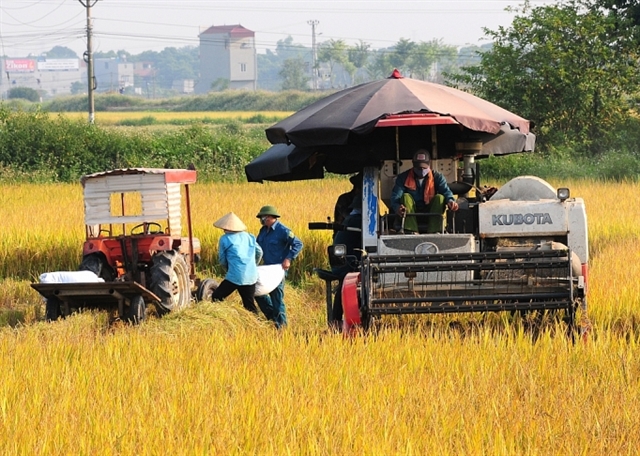Viet Nam must now import about 70 per cent of its agricultural machinery, mainly from China.

Viet Nam needs policies to promote mechanical engineering in agriculture to increase added value and quality for the farming sector, experts have said.
According to the Ministry of Industry and Trade, agricultural mechanisation still had very low levels of adoption in Viet Nam with an average of 1.6 horsepower (HP) per hectare, much lower than 4HP per hectare of Thailand, 8HP of China and 10HP of the Republic of Korea,
Viet Nam must now import about 70 per cent of its agricultural machinery, mainly from China. Domestically-produced agricultural machines cost 15-20 per cent more than those imported from China.
Phan Tan Ben, director of Phan Tan Agricultural Machinery Company Limited, said the local agricultural machinery industry was outdated and was about to come to a dead-end compared to the rapid development of other regional countries.
Agriculture mechanisation was taking place but the machinery was mostly imported while domestically-produced machines were losing their position in the market, Ben said.
The main reason for this situation was that Viet Nam had not developed spearheads in mechanical engineering and agricultural mechanism in particular, lacking strategies for the industry's development.
He added there was also a lack of resources for investment in the industry, outdated technologies and a shortage of raw materials. In addition, competition from imported machines from China, Japan and the Republic of Korea was also an issue, he said.
According to Nguyen Chi Sang, deputy chairman of the Viet Nam Association of Mechanical Enterprises, market demand for each type of agricultural machine remained small, which would not ensure an economy of scale.
Another factor was that mechanical projects required very huge investment, Sang said, adding that most Vietnamese firms lacked such huge capital while the Government’s support remained limited. In addition, the part-supplying industry for the mechanical industry had not been developed.
The Ministry of Agriculture and Rural Development forecast Viet Nam had significant demand for agricultural machinery by 2025, including 500-1,000 rice planting machines per year and 2,000-3,000 rice combine harvesters annually.
Demand for harvester machines for sugarcane, coffee, corn, been and peanuts would be three to five times higher.
Nguyen The Ha, director of Bui Van Ngo Technology Institute, said that the Mekong Delta had a large demand for agricultural machinery which was estimated to amount to billions of dollars.
According to Ben, the Government’s support in terms of capital, tax and land policies and human resources was critical for the development of the agricultural machinery industry.
The Ministry of Industry and Trade said to develop the mechanical industry, it was necessary to develop policies to encourage large-scale agricultural production.
The Ministry of Agriculture and Rural Development said it was studying a special credit package for the purchase of agricultural machines which would accelerate agricultural mechanisation. The package will be proposed to the Government for consideration. — VNS





